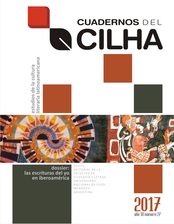El discurso autobiográfico y la responsabilidad de los "hijos" en un contrapunto escritural: en torno a Los rendidos, de José Carlos Agüero, y La distancia que nos separa, de Renato Cisneros
Palavras-chave:
Autobiografía, Testimonio, Autoficción, Relato de filiación, Literatura de los hijosResumo
El conocido periodista peruano Renato Cisneros es hijo del militar peruano Luis Federico "El Gaucho" Cisneros; éste fue ministro del Interior bajo la dictadura de Francisco Morales Bermúdez (1975 – 1980) y ministro de Guerra durante el segundo gobierno de Belaúnde (1980 – 1985), en uno de los períodos más difíciles de la guerra de Sendero Luminoso y Tupac Amaru; el poeta José Carlos Agüero, por su parte, es activista de derechos humanos e hijo de senderistas ajusticiados extrajudicialmente: en 1986 José Manuel Agüero, su padre, y en 1992, Silvia Solórzano, su madre. Tanto Cisneros como Agüero han publicado recientemente textos en que dan cuenta de la violencia vivida por el Perú en aquellos años, desde una perspectiva muy personal. En ambos escuece la interrogación sobre la actividad política de los padres, y la interrogación sobre la herencia, las culpas y las responsabilidades está implícita o explícitamente plasmada en sus relatos. Pero en tanto Renato Cisneros hace de su libro, La distancia que nos separa (2016), una "novela de autoficción", José Carlos Agüero presenta el suyo, Los rendidos. Sobre el don de perdonar (2015), como un conjunto de "relatos cortos, a media carrera entre reflexiones y apuntes biográficos de una época de violencia". La diferencia de sus diferentes enfoques no solo dice relación con la política y la reflexión sobre los derechos humanos, sino que también se revela en las formas escriturales con que configuran sus relatos y en ellos, a sus respectivos progenitores. A continuación, analizaré ambas narrativas a partir del concepto de "relato de filiación", propuesto por Dominique Viart (2009) para la narrativa de los hijos en la literatura europea postholocausto. Se verá cómo opera en ellos este tipo de relato entre lo autobiográfico y lo ficcional (Roos, 2013), cómo cada uno resuelve el problema de la herencia política y la memoria, y cómo ambos crean, al mismo tiempo que un texto sobre la memoria reciente, su propia fisonomía como autores literarios.
Referências
Agüero, José Carlos. Los rendidos. Sobre el don de perdonar. Lima: Instituto de Estudios Peruanos, 2016 [2015].
Agüero, José Carlos. Enemigo. Lima: Intermezzo Tropical, 2016.
Amaro, Lorena. "Bestsellers de la memoria", Revista Santiago, n. 1, 2016: 90–92.
Cisneros, Renato. La distancia que nos separa. Buenos Aires: Seix-Barral, 2016 [2015].
Condori, Luis. "Renato Cisneros: ‘En realidad el libro humaniza mucho a mi padre’", La República, 4 de agosto de 2015. Página web: http://larepublica.pe/cultural/20157-renato-cisneros-en-realidad-el-librohumaniza-mucho-mi-padre. Consultado en 15/04/2017.
Demanze, Laurent. "Récits de filiation". Prólogo à Encres orphelines. Paris: Corti, 2008. Sitio web:
http://www.fabula.org/atelier.php?R%26eacute%3Bcits_de_filiation
Derrida, Jacques. Perdonar lo imperdonable y lo imprescriptible. Santiago de Chile: LOM, 2017.
De Vivanco, Lucero. "Los rendidos. Sobre el don de perdonar", Mensaje n. 641, 2015: 63.
Jelin, Elizabeth. Los trabajos de la memoria. Madrid: Siglo XXI, 2002.
Lejeune, Philippe. El pacto autobiográfico y otros estudios. Madrid: Megazul–Endimión, 1994.
Narciso, Carlos. "Renato Cisneros: ‘Tengo ahora el desafío de vivir para escribir’", Comercio (Cultura), 3 de diciembre de 2015. Página web: http://diariocorreo.pe/cultura/me-plantee-el-desafio-de-vivir-para-escribir-637297/ Consultado en 15/04/2017.
Roos, Sarah. "Micro y macrohistoria en los relatos de filiación chilenos", Aisthesis. Revista de Investigaciones Estéticas, n. 54, 2013: 335–351.
Sarlo, Beatriz. Tiempo pasado. Cultura de la memoria y giro subjetivo. Una discusión. Buenos Aires: Siglo Veintiuno, 2005.
Viart, Dominique. "Le silence des pères au principe du «récit de filiation»", Études françaises, n. 3, Volume 45 (Figures de l’héritier dans le roman contemporain), 2009: 95-112.












































